ADATA Premier SP610 SSD (256GB & 512GB) Review: Say Hello to an SMI Controller
by Kristian Vättö on June 27, 2014 2:00 PM EST- Posted in
- Storage
- SSDs
- ADATA
- SP610
- Silicon Motion
Random Read/Write Speed
The four corners of SSD performance are as follows: random read, random write, sequential read and sequential write speed. Random accesses are generally small in size, while sequential accesses tend to be larger and thus we have the four Iometer tests we use in all of our reviews.
Our first test writes 4KB in a completely random pattern over an 8GB space of the drive to simulate the sort of random access that you'd see on an OS drive (even this is more stressful than a normal desktop user would see). We perform three concurrent IOs and run the test for 3 minutes. The results reported are in average MB/s over the entire time.
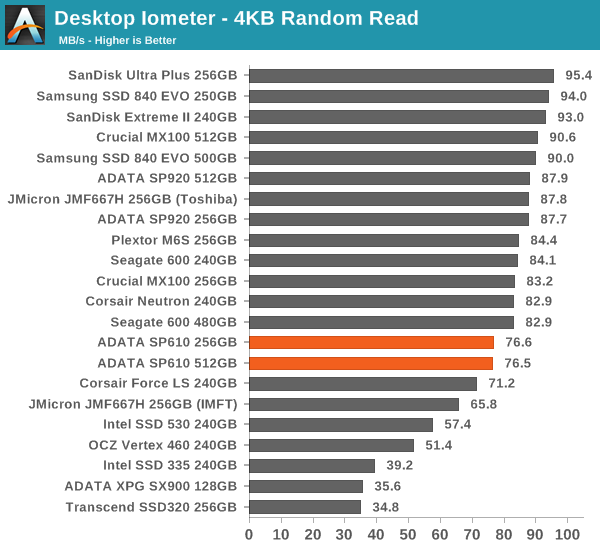
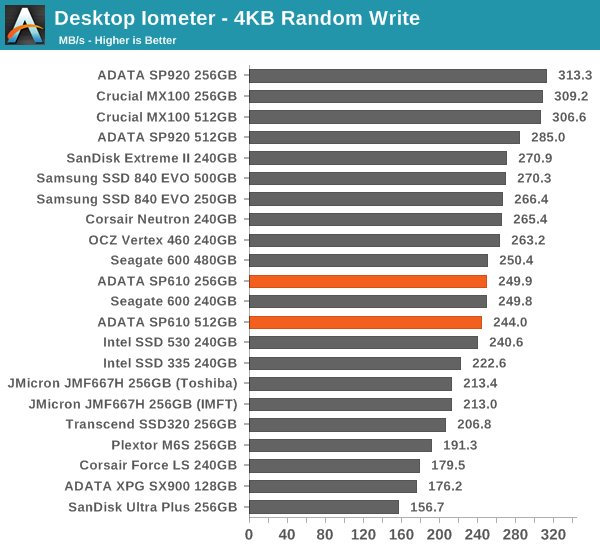
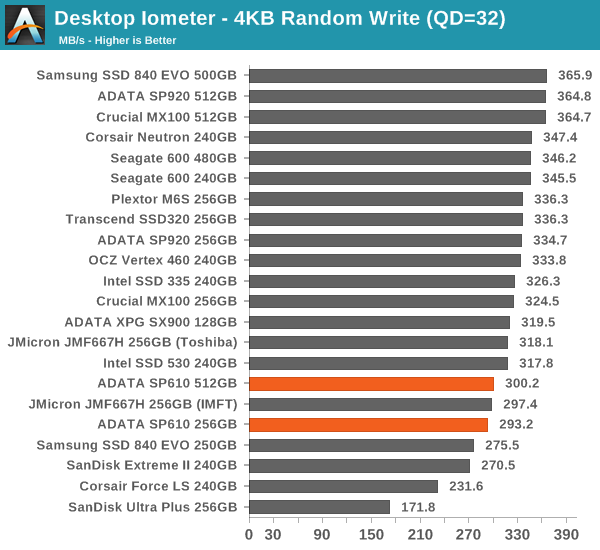
Random performance is mediocre but certainly fine for a lower-end controller.
Sequential Read/Write Speed
To measure sequential performance we run a 1 minute long 128KB sequential test over the entire span of the drive at a queue depth of 1. The results reported are in average MB/s over the entire test length.
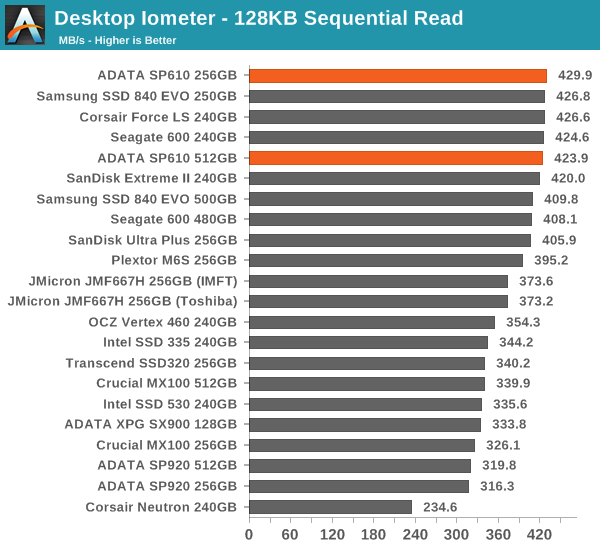
Sequential performance, especially read speed, is very good. The high read speed might explain why the SP610 did so well in the 2013 Storage Bench when looking at the average data rate.
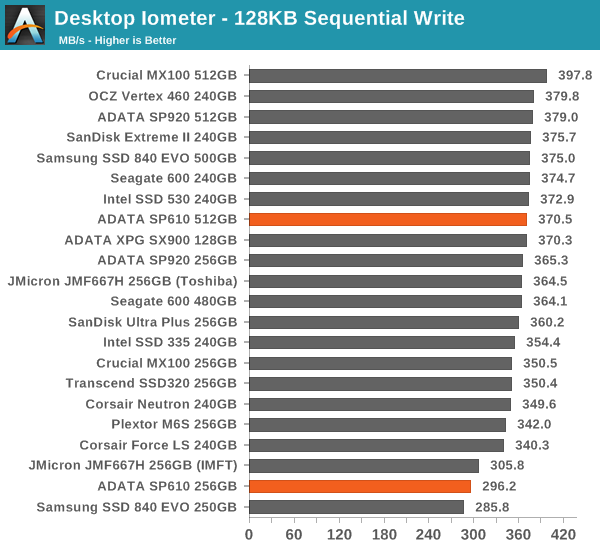
AS-SSD Incompressible Sequential Read/Write Performance
The AS-SSD sequential benchmark uses incompressible data for all of its transfers. The result is a pretty big reduction in sequential write speed on SandForce based controllers, but it doesn't impact most of the other controller much if at all..
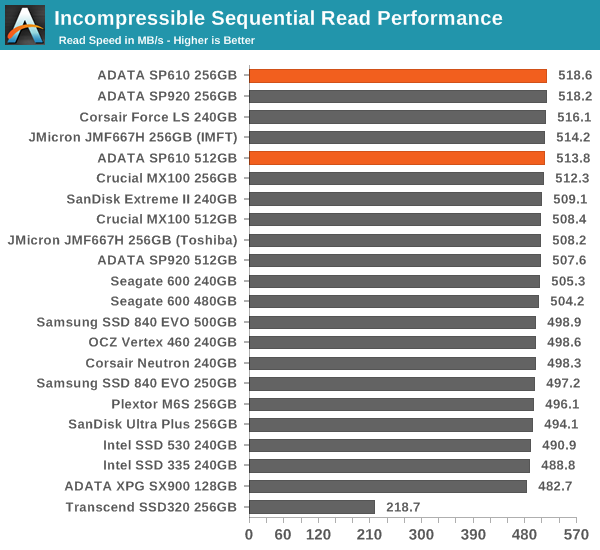
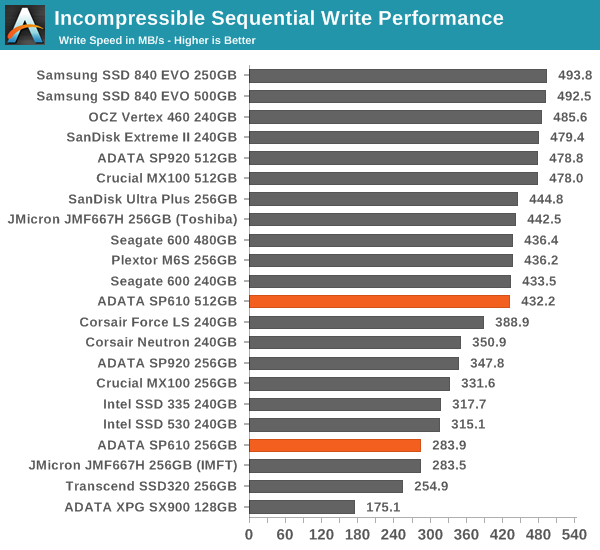










24 Comments
View All Comments
nicolapeluchetti - Friday, June 27, 2014 - link
Has anyone any idea on why the Samsung SSD 840 Pro is so bad in Anandtech Bench 2013 and so good in 2011? Here is the link it did 142 in 2013 http://www.anandtech.com/show/8170/sandisk-extreme... Nut in 2011 it's number 1 http://www.anandtech.com/show/8170/sandisk-extreme...How is this possible?I mean are the workloads so different?Did Samsung optimize the controller for the test?
WithoutWeakness - Friday, June 27, 2014 - link
The 2013 Bench is definitely different enough to have different results for a given drive. More detailed info on the differences between the 2011 and 2013 benches can be found here: http://www.anandtech.com/show/6884/crucial-micron-...Muyoso - Friday, June 27, 2014 - link
Yea, I bought the 840 Pro on the basis of that 2011 test bench, and now everytime I see an SSD review I am sad to see how ravaged it gets vs the competition.CrystalBay - Friday, June 27, 2014 - link
I wouldn't worry about the 840P it still a top drive with excellent support . Come this September Samsung is going bring out some new drives. I'm very curious about what's next from them.Kristian Vättö - Friday, June 27, 2014 - link
Maybe September is coming sooner than you think ;-)CrystalBay - Friday, June 27, 2014 - link
Oh what a nice surprise ! can't wait....Galatian - Saturday, June 28, 2014 - link
Which answers my question wether I should get the XP941 now for my ASRock Extreme9 or wait ;-)Khenglish - Friday, June 27, 2014 - link
It has to do with how the 840Pro handles garbage collection. Basically the way the 2013 test is structured the 840Pro delays far longer than it should before reorganizing itself, but the 2011 test is less stressful in this regard. This means that the 840Pro is a very fast drive if you don't have it running at 100% at all times, but if you are then other drives are likely preferable.althaz - Sunday, June 29, 2014 - link
The 2013 test is more enterprisey. The 2011 test is a better indicator of performance if you half-fill your SSD and use it for your OS plus a few core apps. If you fill it up and use it for everything, the 2013 test is more useful.nitro912gr - Friday, June 27, 2014 - link
I can find the evo 840 250GB at the same price with that adata sp610, should I go with the later since it is bundled with the 3.5" case?I can't see much more difference aside that.